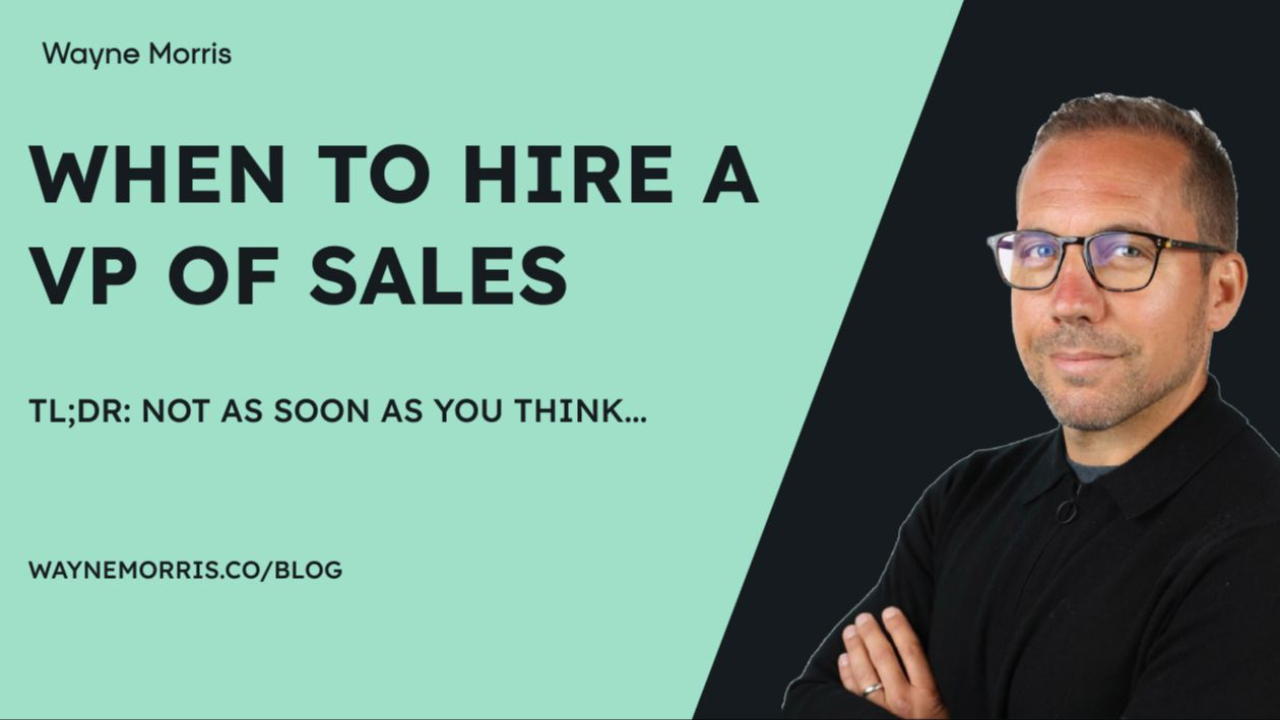
ZT20 #009: When to Hire a VP of Sales
Aug 25, 2023One of the biggest mistakes early stage SaaS founders make is abstracting themselves from the sales process prematurely.
Founders should lead sales throughout the Idea Market Fit, Product Market Fit and the Go-to-Market fit phases of growth, and only abstract themselves when they are ready to scale.

fig 1: Optimal growth stage leaders
What normally happens
What has become normal in SaaS is that the founder looks to abstract themselves before they have product market fit, they deliver an over-inflated title such as Chief Revenue Officer, give away a small amount of equity relative to the scale of the challenge, and just maintain this strategy until they eventually figure it out or run out of money.
Running out of money was not an issue for many in the era of zero interest rate, but now that’s changed.

fig 2: how founders build out their GTM leadership
You don’t need a Chief Revenue Officer in the Product Market Fit stage or the Go-to-Market fit stage, and you may not need one in the first iteration of the scale-up phase either. It depends on who you have as founder. You may just need a VP of Sales alongside a VP of Customer Success and a VP of Marketing all reporting up to the CEO.
However, depending on how you’re structured, the earliest I would sign off on a CRO is at the point of scale, when the CRO is leading leaders versus leading ICs.
When none of the founders have a sales background
Founders often argue they need a sales specialist when none of the founding team has a background in sales. In this situation, in my opinion, if that's the case the founder has 2 options:
- Look for a co-founder with a sales background
- Hire an executive co-pilot to get you go-to-market fit then hire your VP of Sales
The co-founder option is the optimal operational option in my opinion. You’ll have to give up a chunk of equity, a board seat, a vote etc. and most founders I know are not prepared to do that, largely because they get to this realisation once the cap table is already set and won’t allow for such dilution.
In that case, the executive co-pilot option is where I’d focus (yes, I appreciate I’m talking up my book here, but I truly believe it’s the next best option) - check out what some of my CEOs have to say here.
The executive co-pilot likely has more experience and pedigree than anyone you can hire and will cost less in both cash and equity, and will get you to where you are headed faster and more effectively - at least that’s the intention. And when you’re ready to scale, you leverage them to help you hire your executive team and specifically the VP of Sales.

fig 3: Founder partnering with an executive co-pilot
Like what you've read so far? Need help with GTM? Let's chat
Book a Strategy Call
Going the FTE employee route early doors
If you want to ignore my advice completely and you buy into the need to always have a full-time employee supporting the founder to lead GTM right out of the gate, here’s my advice: rather than offer inflated titles and measly equity, offer an evolving title and elevated equity that fairly reflects the stage of growth and the respective scale of difficulty.
I’ve offered some guidance here that is miles off what we see in the market today, but we live in hope...

fig 4: Fair title and equity for early-stage sales leaders as FTEs
Don’t over-index on the promise of help from your VCs
You must have GTM expertise right by your side as you are building, you'll just get to where you are headed faster and with less pain.
Your VC will likely pitch you on “operator capital” coming as part of the package of them investing in you. I would strongly encourage you to have limited expectations of the value of ‘Operating Partners’ at VCs.
I’ve worked with many of them and a number I count as friends. What founders really need at this stage of growth is someone in the weeds with them. Sure, the sounding board from afar can be useful, if the operating partner has truly been an operator at your stage of growth.
Some of the operating partners I’ve worked with are super competent and have been excellent sounding boards, but they have been far from true operating partners. They themselves are stretched thin and almost never get into the weeds for a sustained period with their portfolio companies.
Summary:
I strongly advise all founders to stay close to the market (sales) until they have successfully exited the Go-to-Market fit phase of my framework. At that point, it should be about replicating what has worked, at scale and doing it more efficiently. You’ll no longer have the time to straddle both overall company strategy and execution on the GTM side of things, so this is the time to abstract, and no sooner.
Good luck folks, you've got this! 👊🏼
Wayne
Strategy call: If this resonates and you’d like to have a strategy call with me, please find time here
Testimonial: If you LOVED this newsletter, I’d be eternally grateful if you recorded a video testimonial here, it will help keep me writing, and help keep it free 🙏🏼
Peace & Love to you all ✌🏼💙
#sales #saas #startups #venturecapital #GTMdebt
